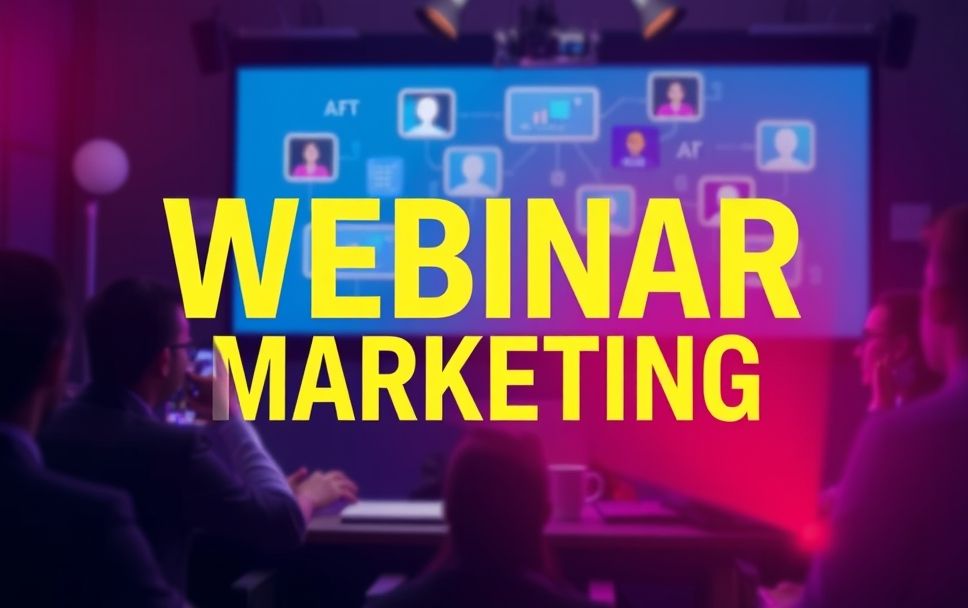Webinar Marketing: The Definitive Glossary
Webinar marketing is a digital marketing strategy that utilizes online seminars, or webinars, to connect with an audience, educate them on specific topics, showcase products or services, and generate leads. This approach combines the power of live video with interactive features to engage participants, making it an essential tool in the digital marketer’s toolkit.
Understanding the Importance of Webinar Marketing
In today’s fast-paced digital landscape, engaging potential customers requires innovative and effective strategies. Webinar marketing stands out as a unique method that not only provides valuable content but also fosters real-time interaction. This allows businesses to build trust and credibility with their audience.
According to a Statista report, over 60% of marketers use webinars as a part of their content marketing strategy, highlighting their significance in generating leads and nurturing customer relationships. Additionally, webinars can be repurposed into various formats, such as blog posts, podcasts, and social media snippets, amplifying their reach.
Core Elements of Webinar Marketing
Successful webinar marketing hinges on several key elements:
- Topic Selection: Choose a relevant topic that addresses your audience’s pain points or interests. For instance, a software company might host a webinar on “Best Practices for Remote Collaboration Tools.”
- Platform Choice: Select a reliable platform that supports video, audio, and interactive features. Popular options include Zoom, GoToWebinar, and Webex.
- Promotion: Use various channels to promote your webinar, including email campaigns, social media, and your website. Engaging visuals and compelling copy can drive sign-ups.
- Follow-Up: After the webinar, follow up with attendees. Send a thank-you email, share a recording of the webinar, and provide additional resources to nurture the relationship.
Practical Applications of Webinar Marketing
Webinar marketing can be utilized in various practical ways, including:
- Lead Generation: Use webinars as a lead magnet. Attendees must register with their contact information, allowing businesses to build their email lists. For example, a digital marketing agency might offer a free webinar on “SEO Strategies for 2023” to attract potential clients.
- Product Demonstrations: Showcase your products in action. A tech company can demonstrate how to use their software during a live webinar, allowing potential customers to see its features and benefits firsthand.
- Expert Interviews: Host industry experts to discuss trending topics. This not only adds credibility to your brand but also attracts a wider audience interested in the guest speaker’s insights.
- Training and Education: Offer training sessions for customers or employees. For instance, a software company may provide onboarding webinars to help new users understand their platform better.
Best Practices for Effective Webinar Marketing
To maximize the impact of your webinars, consider these best practices:
- Engage Your Audience: Use polls, Q&A sessions, and interactive elements to keep participants engaged. For example, during a webinar about digital marketing trends, you could ask attendees what strategies they find most effective.
- Keep It Concise: Aim for a duration of 30 to 60 minutes. This helps maintain attention while delivering valuable content. Ensure that your presentation is structured and to the point.
- Leverage Social Proof: Share testimonials or case studies during the webinar to illustrate your points. This builds trust and encourages attendees to consider your offerings.
- Record and Repurpose: Record your webinars and repurpose them into other formats such as video snippets, blog posts, or podcasts. This extends the lifespan of your content and reaches a broader audience.
Related Concepts and Terms
Webinar marketing connects with several related concepts in digital marketing:
- Content Marketing: Webinars are a form of content marketing that provides value through education and engagement.
- Lead Nurturing: Following up with webinar attendees is a crucial part of nurturing leads and progressing them through the sales funnel.
- Email Marketing: Promoting webinars through email campaigns is an effective strategy to reach and engage potential participants.
- Video Marketing: Webinars leverage video content to create a dynamic and interactive experience for viewers.
How to Implement Webinar Marketing in Your Strategy
To successfully implement webinar marketing in your digital marketing strategy, follow these steps:
- Identify Your Audience: Understand who your target audience is and what topics interest them.
- Plan Your Content: Create a detailed outline of your webinar content, including key points and visuals to be used.
- Choose the Right Time: Schedule your webinar at a time that is convenient for your audience, considering time zones and availability.
- Promote Effectively: Use social media, email, and your website to promote the webinar. Create eye-catching graphics and clear calls to action.
- Engage During the Webinar: Use interactive tools to engage participants and encourage questions. This makes the experience more valuable for attendees.
Conclusion: The Value of Webinar Marketing
Webinar marketing is more than just a trend; it’s a powerful tool that can enhance your digital marketing efforts. By providing valuable content and fostering engagement, businesses can build trust and loyalty among their audience. Whether you are a student learning the ropes of digital marketing or a seasoned professional looking to refine your strategies, incorporating webinars into your marketing plan can yield significant returns.
As you consider how to integrate webinar marketing into your strategy, reflect on the potential it has to transform audience engagement and lead generation. Are you ready to host your first webinar and connect with your audience in a meaningful way?









